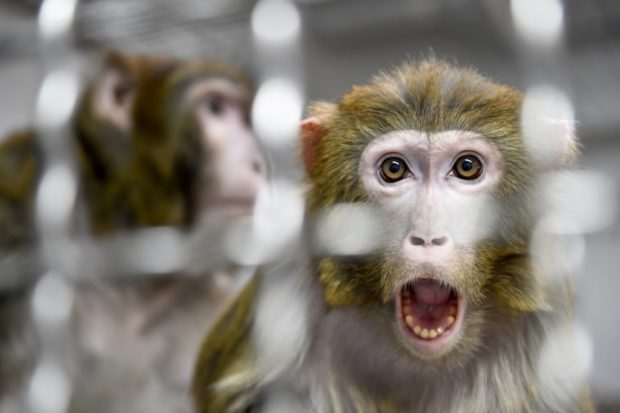Monkeys infected with novel coronavirus developed short-term immunity
WASHINGTON — Test monkeys infected with the novel coronavirus responsible for the COVID-19 pandemic were protected from reinfection for up to 28 days later, a Chinese study out Thursday in the journal Science said.

In this file photo taken on March 13, 2019 A Rhesus macaque, part of the 11 rescued monkeys from research laboratories, sits in the quarantine room of the future animal shelter ‘La Taniere’, in Nogent-le-Phaye near Chartres. Photo by JEAN-FRANCOIS MONIER / AFP
While the monkeys displayed initial immunity, it’s unclear how long such immunity will last in humans – it will be necessary to wait months, or even years, to know if the millions of people infected at the start of the pandemic are protected from re-infection.
Scientists from Peking Union Medical College performed an experiment on rhesus macaques, often used because of their similarities to humans, to find out if they have a short-term immunity to the virus.
Six rhesus macaques were infected in their trachea with a dose of the SARS-CoV-2 virus. They developed mild to moderate symptoms, and took about two weeks to recover.
Twenty-eight days after the first infection, four of the six monkeys received another dose of virus, but this time, despite a brief rise in temperature, they showed no sign of reinfection, the study authors wrote.
By taking frequent samples the researchers discovered that the peak viral load was reached three days after the monkeys were infected.
The monkeys showed a stronger immune response after the first infection, producing more so-called neutralizing antibodies which may have protected them against short-term reinfection, the scientists wrote.
More experiments are needed to see how long this immune defense remains, the authors said.
For more news about the novel coronavirus click here.
What you need to know about Coronavirus.
For more information on COVID-19, call the DOH Hotline: (02) 86517800 local 1149/1150.
The Inquirer Foundation supports our healthcare frontliners and is still accepting cash donations to be deposited at Banco de Oro (BDO) current account #007960018860 or donate through PayMaya using this link.